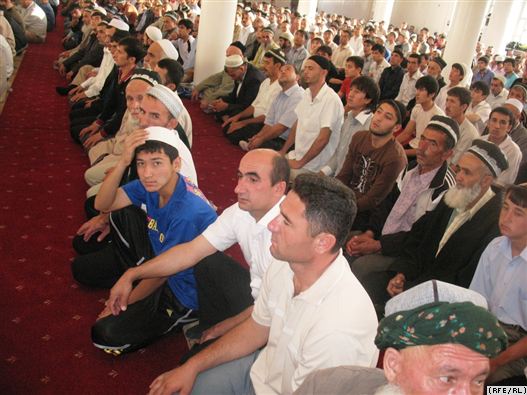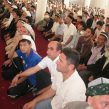
Tajik Police Detain Islamic School Leader and Students
Publication: Eurasia Daily Monitor Volume: 7 Issue: 154
By:

On August 1, police in Tajikistan detained Mavlavi Abduqahor, the leader of an unregistered Islamic school in the Rudaki district south of Dushanbe, along with about 70 of his students. According to Tajikistan’s Islamic Revival Party (IRPT), the religious leader and some of his students were beaten up by police and then taken to Dushanbe (IRPT website, www.nahzat.tj, August 3). The Ministry of Internal Affairs (MIA) Spokesperson, Mahmadullo Asadulloev, told Radio Ozodi on August 3 that Asadulloev was detained for teaching children below the minimum age set for religious learning, failing to follow school hygiene regulations, and teaching religion without a license. This is already the second time this year that Abduqahor was detained on similar charges (Asia Plus, August 3).
The MIA official said Abduqakor’s detention was part of an effort to close down all unregistered madrasahs –schools teaching Islam– in Tajikistan. Seven unsanctioned religious schools were uncovered and suspended by law-enforcement agencies in northern Tajikistan’s Sughd province in July alone (www.ozodi,tj, August 2). Earlier this year, police across the country raided dozens of private homes and mosques where children studied Islam, mostly in the evenings and weekends. Many of the raids resulted in detentions and arrests. Some unregistered mosques, running classes for children, were demolished (Asia Plus, May 27).
Tajik authorities justify their raids against unapproved madrasahs as an attempt to prevent the rise of religious radicalism in Tajikistan’s predominantly Muslim society. They fear that religious leaders with an extremist agenda might use religious classes to indoctrinate children and promote hatred towards the secular state. This fear is shared by a significant part of the population. In 2009, the Tajik parliament passed a new Law on Religion, allowing tough restrictions on private Islamic education. Although the law permits private religious schools in the country, it requires that they register with the culture ministry, and teachers in such schools obtain an appropriate license (Kuriyer Tajikistana, April 8).
There are approximately 20 registered madrasahs at the secondary school level and an Islamic Institute in Tajikistan. This number is clearly not enough to meet the rapidly growing demand for religious education in the country with a population of more than seven million. Besides, most of these institutions are based in cities and district centers, whereas more than 70 percent of the population live in rural areas (www.ferghana.ru, July 13).
Consequently, many parents choose to educate their children in Islam by sending them to unofficial classes run by local mullahs, who often have no formal education themselves.
Analysts suggest that the authorities’ tough measures against such classes infuriate religious leaders and alienate moderate Muslims. Deputy Head of the IRPT, Muhammadali Hayit, told Asia Plus on August 3 that the “secular extremism of the Tajik government breeds Islamic extremism.” Unable to learn more about the religion through schools, many young Tajiks attend underground meetings of Islamic groups, exchange literature and DVD’s with religious –and, at times, jihadist– content. A growing number of parents choose to send their children to unsanctioned madrasahs in Pakistan, Iran, the Turkish Republic of Northern Cyprus, and Arab countries. According to some estimates, about 4,000 Tajiks now study at unofficial madrasahs in these countries (Najot, July 1). As curricula in these schools are beyond the Tajik government’s control, there are fears that some of their graduates will return home with deep-seated radical views and animosity towards the country’s secular regime. The two religious movements banned in Tajikistan last year reportedly for “preaching radical and extremist ideas” –Salafiyyah and Jamoati Tabligh– were created and run by graduates of Pakistani madrasahs.
The Tajik government seems to be well aware of a strong link between the low level of official religious education and the growing influence of extremist and radical Islamic ideas among the country’s young people. In September 2009, the government introduced a mandatory class on Islam called “Knowledge of Islam” (Ma’rifati Islom) to the state school curriculum. According to the education ministry, which was responsible for developing a curriculum and textbook for the course, the initiative aims at improving students’ knowledge of a more liberal, Hanafi brand of Islam practiced by the majority of the country’s population (Asia Plus, August 12, 2009). However, the content and approach of the new course were fiercely criticized by some prominent clerics who accused the education ministry of failing to consult religious leaders when developing the course curriculum. Moreover, the ministry is increasingly criticized for entrusting the teaching of the new class to history teachers rather than graduates of the country’s Islamic Institute who have formal training on religious subjects.
It is unlikely that the mandatory class on Islam taught by poorly trained teachers will meet the growing demand for religious education in the country. With only 20 sanctioned madrasahs for the entire country, Tajiks will increasingly opt to send their children to unofficial local religious schools and foreign madrasahs.




